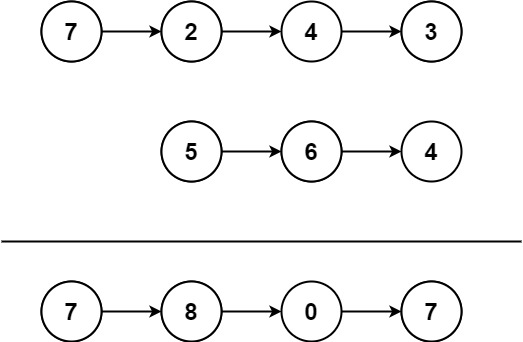English
445. Add Two Numbers II 
Problem Statement:
You are given two non-empty linked lists representing two non-negative integers. The most significant digit comes first and each of their nodes contains a single digit. Add the two numbers and return the sum as a linked list.
You may assume the two numbers do not contain any leading zero, except the number 0 itself.
Example 1:

Input: l1 = [7,2,4,3], l2 = [5,6,4]
Output: [7,8,0,7]
Example 2:
Input: l1 = [2,4,3], l2 = [5,6,4]
Output: [8,0,7]
Example 3:
Input: l1 = [0], l2 = [0]
Output: [0]
Constraints:
- The number of nodes in each linked list is in the range
[1, 100]. - 0 <= Node.val <= 9
- It is guaranteed that the list represents a number that does not have leading zeros.
Follow up: Could you solve it without reversing the input lists?
Solution:
java
public static ListNode addTwoNumbers(ListNode l1, ListNode l2) {
ListNode res = null;
int carry = 0;
Stack<Integer> s1 = new Stack<>(),
s2 = new Stack<>();
while (l1 != null || l2 != null) {
if (l1 != null) {
s1.push(l1.val);
l1 = l1.next;
}
if (l2 != null) {
s2.push(l2.val);
l2 = l2.next;
}
}
while (!s1.isEmpty() || !s2.isEmpty() || carry != 0) {
int n1 = s1.isEmpty() ? 0 : s1.pop(),
n2 = s2.isEmpty() ? 0 : s2.pop();
int temp = n1 + n2 + carry;
ListNode newNode = new ListNode(temp % 10);
newNode.next = res;
res = newNode;
carry = temp / 10;
}
return res;
}
...
